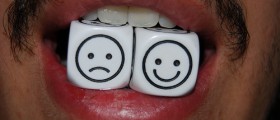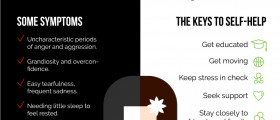
Bipolar disorder or manic depression is a condition characterised by mood swings. Mood swings vary from extremely depressed to extremely hyperactive. Depending on the severity of the condition symptoms of mood swings differ in intensity and interval. The symptoms are numerous and include sleeping disorders, eating disorders, irritability, pessimism, high and low energy states, sadness and happiness, etc. One thing in common to the symptoms even though they are so different in their intensity. Mood swings can appear both suddenly and gradually. Bipolar disorder is believed to be genetic in origin and in most cases develops between ages of 15 and 24. The mood swing patterns vary widely between individuals affected. The exact cause to this condition is unknown.
Bipolar disorder complications
Complications start to appear when a person with bipolar disorder actions become drastic and reckless. These include socially unusual behaviour, violent behaviour, self inflicted injuries and suicide. Researchers say that suicidal tendencies are 15 to 20 times greater than general population. This is a long term risk, since bipolar disorder is known to relapse even after successful treatment. Studies results are different and state that between 20 and 50% of individuals with bipolar disorder have at least one suicide attempt in a lifetime.
Bipolar disorder crisis plan
When the bipolar disorder symptoms become severe and include aggression toward others, self neglecting and suicide risk crisis plan should be developed for person affected. This is also recommended by the National Institute for Clinical Excellence (NICE).
Crisis plan should include a list of potential and known environmental, personal and social triggers and symptoms that can indicate a relapse. Procedure for regulating the dose of medication in case of sudden mania states or appearance of warning signs should be prepared in advance and kept close at hand. Procedure should also exist for how the primary and secondary healthcare services should react in case of notable increase in risky behaviour. It is good for the individual and his or her close ones to know how to get fast help by knowing the contact details of healthcare professionals that can react fast in case of crisis.
Studies indicate that long term treatment reduces suicide rates in people with bipolar disorder. Some observational studies have discovered that certain medications used in long term treatments reduce suicide rates more efficiently. For instance, lithium carbonate seems to produce better results than carbamazepine. It should be noted that lithium is most common medication used for bipolar disorder treatment. The emphasis should be set on follow up, supportive psychotherapy and blood testing.

















Your thoughts on this
Loading...